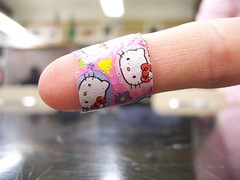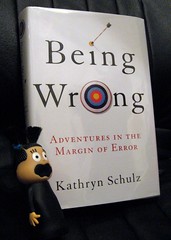Don’t forget to share your best writing lesson for a chance to win fabulous prizes!
Obviously, nobody else knows our story and our characters like we, the authors, do. While critique partners are absolutely invaluable in telling whether a scene or even the whole plot works, they don’t have to be the be-all and end-all when it comes to determining what, exactly, goes into your story. As I said yesterday, immediately changing your work based on one person’s opinion is a knee-jerk reaction means you’re writing to an audience of one.
This is exactly why we need more than one critique partner. In fact, it’s why we need even that first critique partner. When one person has read your story (i.e. you), you have the feedback from one person. When you get feedback from one other person (who, let’s face it, may be just as blind as we are when it comes to storytelling, craft, publishing or what have you), now you have two people’s opinions. What if there’s a tie? What if one of you is dead wrong and cannot see it? What if you both missed something?
 We need several pairs of eyes to look over our work, to catch our mistakes, to offer different points of view, to get as broad a range of opinions before we start trying to get our books out there and published. (Oy—do you know what it feels like to get feedback in a rejection that you’ve already gotten from a critique partner?)
We need several pairs of eyes to look over our work, to catch our mistakes, to offer different points of view, to get as broad a range of opinions before we start trying to get our books out there and published. (Oy—do you know what it feels like to get feedback in a rejection that you’ve already gotten from a critique partner?)
Take your time in getting critiques (the hard part for me!) and in applying them. Let the feedback set in for a few days, and see if your critique partners all or mostly agree on those points.
Several of Rick Daley’s rules for taking critiques hearken back to this principle:
Rule # 3: Seriously contemplate your changes. Take time. Work through it. You never microwave a roast. Slow cooking always turns out better. (NOTE: what’s with all the food references?)
Rule # 4: Look for common threads in the feedback and start there. The advice of the many outweighs the advice of the few. . .
Rule #7: Be ready to disregard any feedback that doesn’t make sense. Sometimes people will tell you to say something different, but that does not always equate to better. Some people may give ill-advised feedback. If it doesn’t make sense and if clarification [rule #6] seems unnecessary, just disregard it.
The majority doesn’t have to rule, of course—it’s still your story. You can do what you want, what you feel is right. But if some advice is truly wrong for your story (because, say, your CP hasn’t read the whole thing yet and couldn’t possibly know that person is the murderer), still look to see if there’s an underlying issue prompting this advice that needs to be resolved. Maybe that character’s behavior in this scene is too strange or leaves too big a clue.
And what if they tell you to cut your favorite part of the story?
The fact that it’s your favorite may be a bad sign in and of itself. We all have our “darlings,” and yes, some of them must be killed. Give the advice some time. Weigh it out. Contemplate how cutting or changing that element would change your story. Could you take it in new directions? Would it deepen the characters? Make the plot stronger? Or just plain be more interesting?
I’ve mentioned this before, but even if we’re initially opposed to some advice, sometimes thinking it through makes a huge difference:
I should add here that fortunately I’ve been a victim of this one, too. My favorite example here is when a critique partner suggested I add a scene near the beginning of the book. I hemmed and hawed over this privately—until the scene started playing out in my mind. It was so entertaining—and just like she said, solved so many problems—that I just had to write it, just to see what it’d look like. (And when I still liked the finished product, I stuck it in there.)
And, as always, remember to thank your critique partners!
What do you think? How do you know when (and when not to) take advice from critiques?
Photo by Casey Smith
 I sometimes feel like I’ve received more than my fair share of bad advice on my writing. (This probably isn’t true, but it still feels that way.) From people who seemed to be half-reading what I wrote, and half just making crap up, to people who were obviously trying to teach me a lesson (which no one else who’d read it seemed to see), from those who were trying to remake my writing to sound like theirs to those who could tell me I was breaking writing “rules” without apparently understanding what the rules were for in the first place—and my personal fave, the person who killed off my killer in the opening scene—sprinkled among fabulous advice from insightful readers that has and continues to help me improve my writing, I’ve gotten an awesome sample of how not to be a critique partner.
I sometimes feel like I’ve received more than my fair share of bad advice on my writing. (This probably isn’t true, but it still feels that way.) From people who seemed to be half-reading what I wrote, and half just making crap up, to people who were obviously trying to teach me a lesson (which no one else who’d read it seemed to see), from those who were trying to remake my writing to sound like theirs to those who could tell me I was breaking writing “rules” without apparently understanding what the rules were for in the first place—and my personal fave, the person who killed off my killer in the opening scene—sprinkled among fabulous advice from insightful readers that has and continues to help me improve my writing, I’ve gotten an awesome sample of how not to be a critique partner.

 For the stuff that’s just off-base, it’s annoying. But for the things that come with that extra note of spite, it’s even harder. This is why I’ve come up with my coping mechanisms—if two other people agree with me, if I can just laugh at it sooner (and laugh at myself), then maybe I can move on faster, right?
For the stuff that’s just off-base, it’s annoying. But for the things that come with that extra note of spite, it’s even harder. This is why I’ve come up with my coping mechanisms—if two other people agree with me, if I can just laugh at it sooner (and laugh at myself), then maybe I can move on faster, right? If you think there might be some merit to some advice (somewhere), or if you’re worried you’re the one with the case of the crazies, turn to someone you trust (especially someone who’s read the story).
If you think there might be some merit to some advice (somewhere), or if you’re worried you’re the one with the case of the crazies, turn to someone you trust (especially someone who’s read the story).  This phrasing comes from
This phrasing comes from  I think we’ve all been there: we get some piece of advice—from a crit partner, from an editor, from a total stranger—that just doesn’t work for our story.
I think we’ve all been there: we get some piece of advice—from a crit partner, from an editor, from a total stranger—that just doesn’t work for our story. 